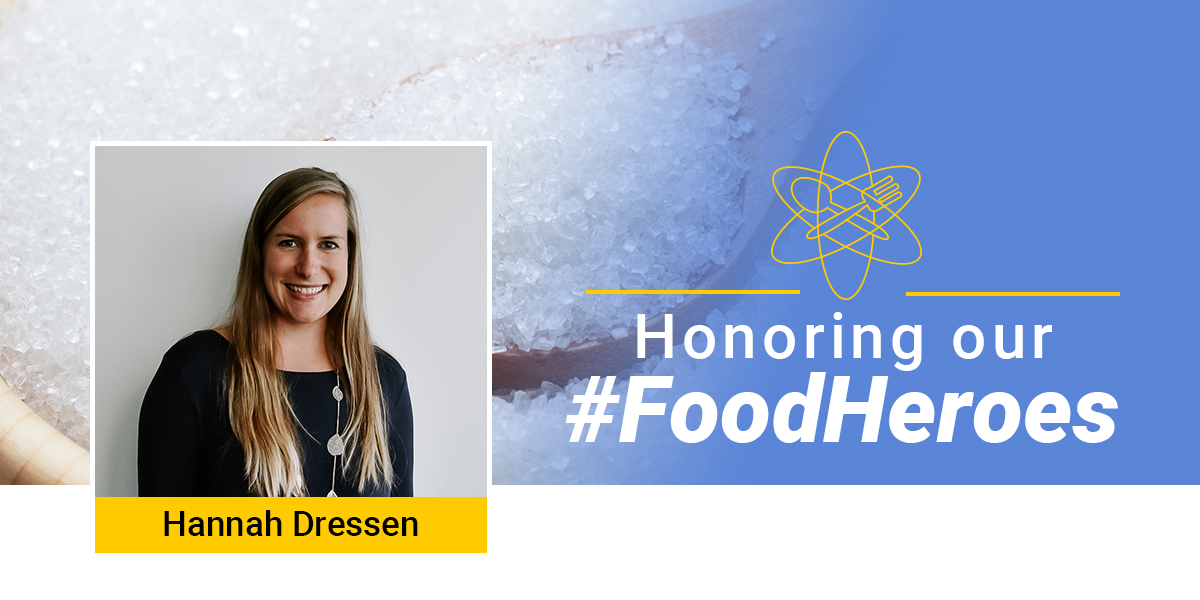
Customer Care Intensifies as Pandemic Continues
Next in our “Food System Heroes” series, a technical product leader in Washington state shares the importance of communication and an unexpected experience while working through the pandemic.

Living in Washington state, where the first U.S. case of the novel coronavirus (COVID-19) was confirmed on Jan. 20 and its spread led to the state becoming the nation’s first epicenter of the outbreak a month later, IFT member Hannah Dressen has grown quite accustomed to working remotely. Her greater Seattle-area office made the shift to a virtual work environment in February, ahead of Washington declaring a state of emergency and later issuing its stay-at-home order. Fortunately, Hannah said her office is completely customer/client-facing, so the transition was seamless and the atmosphere remained pretty positive.
“Besides cancelling all travel, we’re lucky to be operating business as usual,” Hannah shared. “Thankfully, we started transitioning all internal team communication to Microsoft Teams last fall, so the only difference really has been the lack of seeing teammates in the office and instead using video calls for meetings.”
As a Technical Product Leader on the Tate & Lyle Solutions Direct team at Xenon arc, Hannah’s position leverages food science combined with her personal experience in R&D to offer technical support to customers utilizing Tate & Lyle’s portfolio of ingredients. Communication is important—to overcome the distance, her team has daily morning video calls as well as one-on-ones with leadership..
“It’s hard not to see my teammates in person everyday but technology definitely makes it better,” Hannah said.
Some of the biggest work-related challenges for Hannah have come from a logistics standpoint. She said finding freight has been difficult at times, so they have been increasing their timelines more than usual to accommodate. Staying ahead of changes is another constant battle, so her team is connecting with customers almost daily to ensure they are anticipating increases or decreases in needs because the situation is so fluid..
For Hannah, the workplace challenge that proved to be most difficult came from a social-emotional standpoint. “I didn’t expect hearing how everything is affecting my customers to be the biggest challenge, but it is,” Hannah shared. “It’s incredibly difficult to hear from customers you have a long-standing relationship with that their business is shutting down. That’s a conversation you never want to hear, especially from people you’ve been talking to for years. We’re constantly pivoting and trying to see how we can support everyone during this time.”
Despite the challenges, Hannah is extremely grateful to work in an essential industry in the face of this global pandemic. She feels good knowing that what she is doing is supporting everyone in the workforce and at-home and recognizes how fortunate she is to have an essential position she can do from the safety of her home.
From a personal standpoint, Hannah mentioned she is nervous about the loss of favorite local restaurants, bars, ice cream shops, and boutiques that may not be around when this is all over, but she’s trying to stay positive. For her, setting daily or weekly goals and exercising is key. She likes to have at least one thing scheduled for each day—a special dinner, book, exercise, family video chat, educational learning, etc.—to give her something to look forward to, keep the days from melting together, and help her avoid "quarantine laziness."
Hannah also offered this friendly piece of advice. “It’s best to throw on a pair of jeans about once a week to ensure you haven’t gained the quarantine 15 yet.”
Are you a Food System Hero? Share your story on social media with the hashtag #FoodHeroes today!
